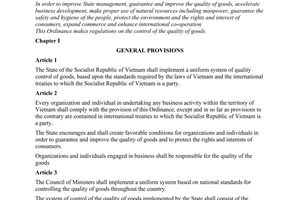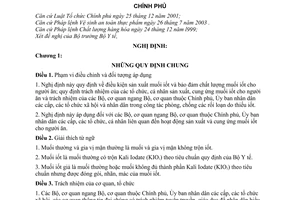Nội dung toàn văn Decree No. 163/2005/ND-CP production and supply of iodized salt for human consumption
|
THE GOVERNMENT |
SOCIALIST REPUBLIC OF VIET NAM |
|
No: 163/2005/ND-CP |
Hanoi, December 29, 2005 |
DECREE
ON PRODUCTION AND SUPPLY OF IODIZED SALT FOR HUMAN CONSUMPTION
GOVERNMENT
Pursuant to the Law on organization of the Government dated December 25, 2001;
Pursuant to the Ordinance on food hygiene and safety dated July 26, 2003; Pursuant to the Ordinance on quality of goods dated December 24, 1999;
At the proposal of the Minister of Health,
DECREES:
Chapter 1:
GENERAL PROVISIONS
Article 1. Scope of regulation and subjects of application
1. This decree provides conditions for the production of iodized salt (IS) and assurance of IS quality for human consumption, regulates the responsibilities of organizations and individuals producing and trading in IS for human consumption, and regulates responsibilities of Ministries, Ministerial level Agencies, Government Agencies, People’s Committees at all levels, Social Organizations and People in prevention of iodine deficiency disorders.
2. This decree is applicable to Ministries, Ministerial level Agencies, Government Agencies, People’s Committees at different levels, organizations and individuals producing and trading in IS for human consumption.
Article 2. Interpretation of terms
1. Common salt and common salty spices are often salt and salty spices without iodine.
2. Iodized salt is normally salt mixed with KIO3 (potassium iodate) according to the standards regulated by the Ministry of Health (MOH).
3. Fake IS is non-iodized salt or salt with inadequate content of KIO3 (potassium iodate) disobeying the standards regulated by the MOH but with package, label and brand of IS.
Article 3. Responsibilities of agencies, organizations
1. Ministries, Ministerial level Agencies, Government Agencies, People’s Committees at different levels, Social Organizations and mass media are responsible for advocacy and education, so that the People have clear understanding of the benefits of IS utilization and to obey the laws and regulations on the IS production and utilization.
2. The Ministry of Health will have the responsibilities to:
a) Regulate standard on the quality of potassium iodate (KIO3) for IS mixing;
b) Regulate standards on the iodine content in iodized salt;
c) Regulate standards on the IS production factories and IS transportation vehicles;
d) Provide instructions for people who cannot use IS for pathological reasons,
dd) Examine the quality of IS;
e) Provide training for the officers in charge of IS test;
g) Coordinate with functional agencies, sectors and mass organizations to advocate people to use iodized salt.
3. The Ministry of Agriculture and Rural Development (MARD) will have the responsibilities to:
a) Conduct master plan of IS production network throughout the country;
b) Provide regulations on common salt production.
4. The Ministry of Trade (MOT) will have the responsibilities to manage all trading activities relating to common salt and IS in the market.
5. The Ministry of Culture and Information (MOCI) will have the responsibilities to propagandize the benefits of IS utilization and bad affects of iodine deficiency on people health.
6. The People’s Committees of provinces and centrally run cities will have the responsibilities to:
a) Direct the production and supply of sufficient IS for human consumption, implement the policy on price and cost assistance (if any) for IS trading in accordance with the regulations in force;
b) Organize for communication and advocacy to people to use IS.
Article 4. Prohibited actions
Production, circulation and trading of fake IS and IS failing to ensure quality standard as prescribed.
Chapter 2:
CONDITIONS FOR IS PRODUCTION
Article 5. Conditions for staffs and workers of IS production facilities
1. Testing technicians of the IS production facilities must be able to meet the following requirements:
a) To be trained in IS testing;
b) To be master of the IS production process.
2. Workers directly engaged in IS production must be able to fully meet the following conditions:
a) To be in good health condition according to regulations of MOH and especially do not contact any infectious and skin-diseases;
b) To be master of the IS production process and food hygiene and safety.
Article 6. Conditions for IS production facilities
1. The IS production location must be hygienic and far from hazardous environment according to guide of the MOH.
2. Workshops, storages must be built in such a way to ensure dryness, cleanliness, airiness with waste water drainage system satisfying environmental sanitation requirements. The floor of warehouses must be cemented and the floor of the workshop must be enameled tile. Workshops and warehouses must be arranged in a complex chain, from material warehouse, iodine mixing equipment place to finished product warehouse.
3. The testing laboratory must be fully equipped with tools, chemicals for iodine determination. Testing technicians must be able to meet all requirements set in Item 1, Article 5 of this decree.
4. Production facilities must ensure sufficient labor safety and hygienic devices for workers according to the laws and regulations on labor protection.
Chapter 3:
IS QUALITY
Article 7. Announcement of IS quality
Before distribution into the market, the production facilities must self-announce the quality standard with sufficient iodine content in salt according to regulation of the MOH and such announced quality must be ensured.
Article 8. IS labels
IS labels must be in compliance with laws and regulations on product label and have all necessary information as follows:
1. Name, address of production and processing facilities.
2. The quality registration number of the production and processing facilities.
3. Iodine content
4. Weight.
5. Instructions on preservation and use.
6. Date of production
7. Expiry date.
Article 9. IS packaging, storage and transport
1. When being transported from production locations to distribution points, IS must be packed in packaging materials meeting standards on food hygiene and safety. On the packages there must be symbols of “anti-moisture”, “anti-tear” and “keep away from rain and sunshine".
2. IS must be preserved in well-ventilated warehouses and placed at 0.30m away from the wall, at 0.30m above the floor and 0.50m under the roof.
3. While being on sale, IS must be kept in dry and well-ventilated places, away from sunshine and rain.
4. IS must be transported by covered means of transport to prevent heat and sunshine. Transport means must be hygienic as prescribed.
Chapter 4:
IMPLEMENTATION PRVISIONS
Article 10. Effect
This Decree will enter into full force 15 days after the date published on the Official Gazette. This decree replaces the Government’s Decree 19/1999/ND-CP dated April 10, 1999 on the production and supply of IS for human consumption.
Article 11. Responsibilities for implementation
Ministers, Heads of ministry-ranking agencies, Heads of Government Agencies, Chairpersons of People’s Committees of provinces and centrally run cities will be responsible for the implementation of this decree.
|
|
ON BEHALF OF
GOVERNMENT |
------------------------------------------------------------------------------------------------------
This translation is made by LawSoft and
for reference purposes only. Its copyright is owned by LawSoft
and protected under Clause 2, Article 14 of the Law on Intellectual Property.Your comments are always welcomed



